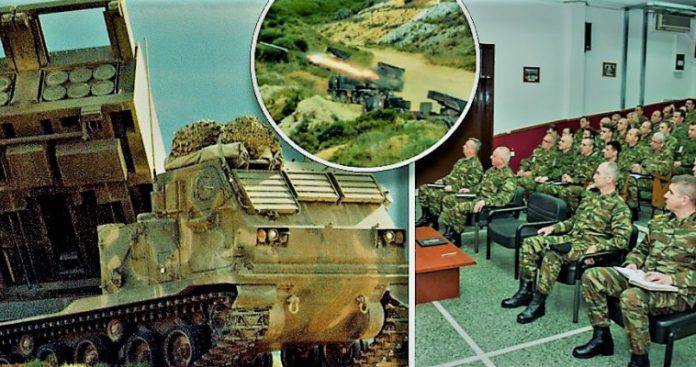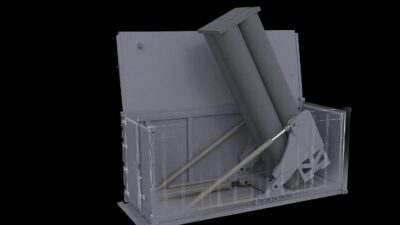Panagiotis Gkartzonikas: Turkish ballistic missiles – Greece needs the “poor man’s nuke”
22/09/2020
The threat posed by Turkish ballistic missiles necessitates an examination of the supply of corresponding missiles by Greece. A ballistic missile is any rocket that relies on its aerodynamic shape for lift and then follows a ballistic trajectory when the thrust ends. Ballistic missiles are divided into tactical missiles with a range of up to 300 km and short-range strategic missiles (from 300 to 1,000 km). Long-distance categories will not concern us here.
Ballistic missiles enable the projection of asymmetric air power from long or very long distances, with a warning time shorter than that of aircraft. The possession of ballistic missiles that can strike targets across national borders and cause massive destruction is considered to increase a country’s standing in the international system.
The great difficulty in dealing with such weapons adds more value to their acquisition. These weapons give strategic prestige to their owner. Such systems are procured even by countries that do not intend to use them, but are interested in improving the image that others have of their military capabilities.
Among other things, the political significance of ballistic missiles is superior to their military value. In the first Gulf War, Saddam Hussein, with his relatively primitive Scud missiles, managed to wreak havoc on Israel and threaten the political cohesion of the American alliance.
Ballistic missiles offer a cheaper (cost-effective) alternative compared to aircraft, while in another sense they are considered the “nuclear weapon of the poor”. Significant numbers of ballistic missiles can be purchased at the price of one or two technologically advanced aircraft, without the consequent cost of training, installation, and maintenance. Investing in large numbers of ballistic missiles may have greater offset value than investing in human-guided systems. The fact that many countries have acquired such systems is also due to their ease of purchase, since many are available in the international market.
Greece under threat
Turkey launched its missile program in the early 1980s, in cooperation with China and Pakistan. The missile systems that it has acquired for about 20 years now, as well as those that it will acquire in the future with the continuation of its missile program, give it unprecedented capabilities and not just in terms of attacking targets. These systems fall into two categories: the Yildirim and BORA short-range ballistic missiles and the Kasirga long-range multiple missile launchers.
Although the latter are not technically ballistic missiles, they should be included in the same category as ballistic missiles due to the fact that their size, orbit, explosive warhead and targets are similar to those of short-range ballistic missiles. Large-caliber multiple rocket launchers differ from short-range ballistic missiles in that they lack built-in guidance (free flight), compensating for this weakness by firing large volumes of fire at a target.
We do not include here the ATACMS missiles that Greece has, because their range is only 175 km. The numbers from each category are not publicly known, however it is certain that Turkey over time, is increasing their number and improving their performance. Turkish missiles can threaten not only urban centers on the islands and mainland Greece but also Athens itself and it is only a matter of time before they cover the entire Greek territory.
Because their political significance is superior to their military value, the political and then the military implications need to be considered first. This is because the former may affect the latter, such as diverting aircraft costs to counter ballistic missiles. Since the political panic, or intimidation, they pose, the threat of using ballistic missiles is more important than their true military value, it is easy for the attacker to be tempted to use these weapons against urban and industrial centers.
If conventional missile warheads are replaced with corresponding nuclear, biological, or chemical ones, then it is understandable that the danger posed by the threat is multiplied. However, it is easy to understand that Turkey does not need to acquire a larger number of missiles in order to effectively threaten Greece and achieve political goals.
Surprise strikes
Ballistic missiles may be used alone, or in combination with other weapon systems. The acquisition of ballistic missiles of even greater range (260 km and more), enables the user (i.e. Turkey) to launch surprise strikes against political and military targets, such as major urban centers, the industrial heart of Greece, ports, naval bases, airports, etc. The results of such a development, in addition to their operational significance, will have a huge psychological impact.
Countries with ballistic missiles use them as systems for strategic results, and so can Turkey. The decision to use them will therefore be taken at the political level. It is more likely that orders and target data will be transmitted through fixed national communication channels than through respective mobile regular channels.
Firing batteries will direct launchers to move from their protected positions to launch sites, launch missiles, and then return to protected positions, or move to other locations. All this is more likely to take place at night and in times of bad weather, to reduce the effectiveness of countermeasures.
In summary, with the new missile capabilities, the Turkish Armed Forces gain superiority in the battle against friendly artillery and in addition acquire capabilities to attack targets in depth, against Greek productive and industrial centers. Finally, they create conditions for the release of part of their air force, from the support of the fight on land and its disposal for the benefit of the aerial operations.
Ballistic missiles: The poor man’s “nukes”
Greece needs to seriously consider, if it has not already done so, whether it should proceed with the procurement of ballistic missiles capable of attacking Turkish territory at a sufficient depth and initially at least the main urban centers. Clearly, it is imperative that this be preceded by an analysis of all the factors influencing the issue: political, military, and economic.
The missiles can act as deterrents on the one hand so that Turkey does not use its own, and on the other hand aggressively to support the always defensive political purposes of the country. Attacking enemy territory with missiles cannot be substituted at the same cost and the same risks by aerial attacks, and that is the main reason for their acquisition.
The supply of missiles is obviously not something that can be implemented immediately, when there are other immediate and pressing needs. However, Turkey did not acquire such systems overnight. However, detailed planning and careful steps are required from now on, in order that such may be implemented at some point in the future. It is possible to argue that Greece should not proceed with such an action, because it will worsen the arms race with Turkey, which Greece will ultimately be unable to monitor.
First, it is not Greece that is leading this “arms race”, but Turkey. When Turkey has made such a leap in weapon system procurements during the last fifteen years, it is not possible to bridge the gap by buying only rifles. Secondly, such a move is primarily a deterrent. Finally, it is necessary to realize that the firepower with which Turkey can strike Greek territory is enormous, even before operations begin. This huge volume of fire can paralyze the country, by neutralizing its military capabilities.





